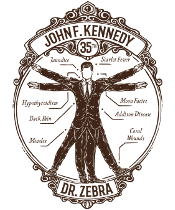

Health and Medical History of President
James BuchananLived 1791-1868
Health and Medical History of President
James BuchananLived 1791-1868
1776-1783
1812-1815
1846-1848
1861-1865
1898-1899
1917-1918
1941-1945
1950-1953
1964-1975
1990-1991
2001-2021

| UNDER CONSTRUCTION |
A journalist of the time wrote "There was no head ache, no faltering steps, no flushed cheek" associated with Buchanan's drinking. "Oh no! All was as cool, as calm and as cautious and watchful as in the beginning. More than one ambitious tyro who sought to follow his... example gathered an early fall" 1b.
Buchanan would begin his drinking with cognac and end with old rye. Two or three bottles might be consumed at one sitting. The press commented on his resistance to alcohol's effects 3a. Comment: The gout, alas, was one effect of alcohol to which he was not resistant.
was a southern town, without the picturesqueness, but with the indolence, the disorder and the want of sanitation. ... Fish and oyster peddlers cried their wares and tooted their horns on the corners. Flocks of geese waddled on [Pennsylvania] Avenue, and hogs, of every size and color, roamed at large, making their muddy wallows on Capitol Hill. ... People emptied slops and refuse in the gutters, and threw dead domestic animals in the canal. Most of the population still depended on the questionable water supply afforded by the wells and by the springs in the hills behind the city. Privies, in the absence of adequate sewage disposal, were plentiful in yards and dirty alleys, and every day the carts of night soil trundled out to the commons ten blocks north of the White House. 5aThus, it is hardly surprising that, not long before his inauguration, President-elect Buchanan was one of many dinner guests at Washington's huge National Hotel to contract a severe "intestinal malady." Buchanan recovered, but one his favorite nephews died of the "National Hotel disease" 5b.
One theory ascribed the disease, which Bumgarner labels as dysentery (bloody diarrhea), to rats that had drowned in the hotel's cooking water, kept in attic reservoirs. Another theory held that frozen pipes had caused sewage to back up to food preparation areas 3b.
Buchanan was ill for several weeks. The question has been raised whether his judgment was impaired while he prepared his inaugural address 3b.
Buchanan was ill for several weeks. Many others got sick from the event, and one died 3b. Rumors in some extreme pro-Southern circles claimed this was a plot to poison the new leaders. In the end, however, most people accepted that sewer gas was the cause (recall that germ theory was not then well established). After closing briefly for repairs, the National Hotel re-opened, and regained its previous popularity 5b.
- Buchanan enjoyed good health during childhood and youth 3a.
- For exercise, Buchanan as President walked every day for an hour on Pennsylvania Avenue, "affably greeting his acquaintances" 5f.
- Summers in the White House were particularly unhealthy. Thus, during summers Buchanan lived in a modest cottage at the Soldier's Home (on a hill three miles outside the Washington city line) 5f.
- Buchanan's personality at dinners was described as "anecdotal, but cold" 5g.
- In the waning days of the administration, there was a plot, led by Senator Louis Wigfall of
Texas, to kidnap President Buchanan. Wigfall would then "install Mr. Breckinridge
[the southern-leaning Vice President] in the White House, and hold the captive President as
a hostage until terms of compromise could be proposed. ... The scheme, however, could not be
executed, in its first stage, without the concurrence and co-operation of Mr. Floyd [Secretary
of War], who threw Wigfall into a paroxysm of explosive wrath by flatly refusing to have anything
to do with the enterprise."
6a
5d
Rumors of Presidential kidnap became almost commonplace during the administration of Buchanan's successor, Abraham Lincoln.
- Unlike all other American Presidents, Buchanan never married. Thus, during his term of office the First Lady was his niece, Harriett Lane, for whom he had been guardian since she was orphaned at the age of eleven. Several years after leaving the White House, Lane married a Baltimore banker, and after his death endowed a home for invalid children at the Johns Hopkins Hospital in Baltimore. To this day the pediatric clinics at Hopkins are called the "Harriet Lane" clinics and the standard pocket book used by generations of pediatrics residents, now in its 14th edition, is called the Harriett Lane Handbook. 7 [Also of note, the song "Listen to the Mockingbird" was dedicated to her 5g]
- Boller, Paul F. Jr. Presidential Anecdotes. New York: Oxford University Press, 1981.
 a pp.117-118 b p.119
a pp.117-118 b p.119 - Remini, Robert V. The Life of Andrew Jackson. New York: Penguin, 1990 (hardback 1988).
 a p.153
a p.153Comment: Well-written, coherent distillation of Remini's definitive three-volume biography of Jackson.
- Bumgarner, John R. The Health of the Presidents: The 41 United States Presidents Through 1993 from a Physician's Point of View. Jefferson, NC: MacFarland & Company, 1994.
 a p.85 b p.86
a p.85 b p.86Comment: Devotes one chapter to each President, through Clinton. Written for the layperson, well-referenced, with areas of speculation clearly identified, Dr. Zebra depends heavily on this book. Dr. Bumgarner survived the Bataan Death March and has written an unforgettable book casting a physician's eye on that experience.
- Dugan, James. Bedlam in the boudoir. Colliers. 22 Feb. 1947; pages 17, 69-70.
Comment: Credibility is dubious. Just before a list of Presidents, the article states: "Twenty of the 32 Presidents ... are proved or believed on a thick web of circumstance to have been nocturnal nuisances in the White House."
- Leech, Margaret. Reveille in Washington 1860-1865. Alexandria: Time-Life Books, 1962.
- Lamon, Ward Hill. Recollections of Abraham Lincoln. Washington, DC: Dorothy Lamon Teillard, 1911.
 a pp.264-265
a pp.264-265 - Engorn B (ed). The Harriet Lane Handbook: Mobile Medicine Series. Philadelphia: Saunders.







